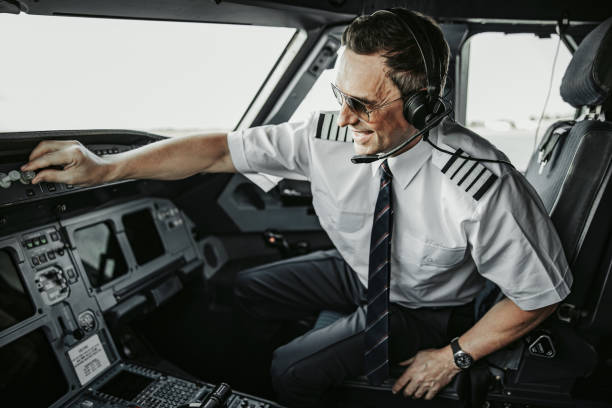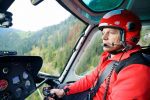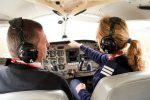
| Airline Pilot Key Stats | |
|---|---|
| Education | 4+ Years |
| Job Outlook | 6% |
Working as an airline pilot offers a great range of benefits.
If you’ve ever flown a plane, or even been a passenger on a flight, you’ll know that it’s an exhilarating experience.
Most pilots begin their career because of their genuine interest in flying, aircraft, and aviation.
Employment prospects are good, as are the salary and working conditions of pilots.
There is also a great deal of opportunity for travel in this role.
Table of Contents
Education Requirements to Become an Airline Pilot
While it’s not a formal requirement, most pilots have a college degree, usually in a field such as engineering, physics, or other sciences.
Commercial airlines will prefer to employ pilots with this kind of academic background.
To become an airline pilot, you must have a commercial pilot’s license.
This license has several parts to it.
To be successful, you must be eighteen years of age or older.
You will then need to complete 250 hours of supervised flight experience.
Once this is complete you can complete your test, which is made up of two parts.
The first is a theory test, FAA rules, flight and navigation knowledge, and safety information will be tested.
You will then need to complete the practical part of the test in an aircraft.
There is also a physical, you will need to be in good health, have good hearing, along with vision at or corrected to 20/20.
The next step to becoming an airline pilot is to gain more experience and flying hours, along with further qualifications.
Before a commercial airline employs a pilot, they will require them to take further tests, including psychological screening and other aptitude tests.
A radio operator’s permit is required within the United States.
Most airlines will also expect pilots to have an airline transport license.
You can train to be a pilot at one of the many FAA schools around the country.
Training to become a pilot is not cheap, and can take years of training and hard work.
One path that many commercial airline pilots have taken is a career in the armed forces as a pilot.
This allows a pilot to train and gain experience, while working and earning money.
Keep in mind that if you earn your pilot’s license with the armed forces, you will have a return of service agreement, where you will need to stay working with them for a certain amount of years.
Airline Pilot Job Description
- Determining weather and conditions before a flight
- Deciding on a flight path
- Checking equipment meets safety requirements
- Taxiing out, taking off, flying, and landing a plane
- Dealing with dangerous situations
- Talking with air traffic control
An airline pilot will spend about 16 days a month working.
Due to strict regulations, a pilot can fly no more than 100 hours in a month, and no more than 1000 hours in a year.
This is because working as a pilot can be stressful, and while on the job they must always be keen and alert.
Airline Pilot Salary and Career Path
Some airline pilots begin their career in the armed forces, others complete a college degree, then work their way through the ranks of an airline.
A qualified commercial pilot might start their career as a flight officer, then be promoted to first officer.
Those who work with regional airlines may find that career progression is faster, however a larger company is always going to be able to offer larger diversity of roles.
Once employed as an airline captain, you will have reached the top of your career ladder.
A brand new pilot at a regional airline might expect to earn around $25,000 to $30,000, however according to BLS.gov, new pilots hired my a major airline can expect to earn around $50,000.
The current median salary of an airline pilot is roughly $100,000 per year.
Senior captains on international routes may earn up to $165,000 per year.
Salary will depend on many things such as the pilots employer, the type of plane they fly, and the routes they fly.
The path to become an airline pilot can be a long one, but if aviation is your passion and you have decided being a pilot is the career for you, then the best advice you can get is to start working towards your pilot’s license as soon as possible.
Enrolling in a college degree with an engineering or science background, or embarking on a career in the military, is a good path to take.
It’s also a good idea to start taking lessons with a certified flight instructor (CFI), and start building up your hours now.
A rewarding career is available for those that are willing to put in the time and the work.
![]() The below information is based on the 2023 BLS national averages.
The below information is based on the 2023 BLS national averages.
National Average Salary
$250,050Average Salary by State
| State | Avg. Annual Salary |
|---|---|
| Alabama | - NA - |
| Alaska | - NA - |
| Arizona | $220,410 |
| Arkansas | $155,560 |
| California | $286,040 |
| Colorado | $179,460 |
| Connecticut | $153,930 |
| Florida | $283,740 |
| Georgia | $219,370 |
| Illinois | $298,460 |
| Indiana | - NA - |
| Iowa | $182,670 |
| Kansas | $122,600 |
| Louisiana | $102,160 |
| Michigan | $240,620 |
| Minnesota | $179,770 |
| Mississippi | $121,280 |
| Missouri | $225,220 |
| Montana | $55,010 |
| Nebraska | $115,080 |
| Nevada | $220,750 |
| New Jersey | $220,990 |
| New Mexico | $137,610 |
| New York | $238,630 |
| North Carolina | $143,140 |
| Ohio | $221,190 |
| Oklahoma | $131,760 |
| Pennsylvania | - NA - |
| South Carolina | $117,460 |
| Tennessee | $128,620 |
| Texas | $227,380 |
| Virginia | $245,980 |
| Washington | $369,440 |
| Wisconsin | $85,010 |
| Wyoming | $106,790 |
| Puerto Rico | - NA - |
The top earning state in the field is Washington, where the average salary is $369,440.
These are the top 5 highest-paying states in the field:
* Employment conditions in your area may vary.
Frequently Asked Questions
What does an airline pilot do?
An airline pilot is a professional that can fly and navigate an aircraft (an airplane or a helicopter).
Pilots transport people and cargo.
Airline pilots usually work on planned flights and follow a fixed schedule of an airline.
Some can actually work for tour companies.
In general, airline pilots spend a lot of time away from home.
The typical responsibilities usually include checking the aircraft before and after the flight; checking the weather conditions and fuel supply; submitting flight plans to air traffic control; communicating through the aircraft radio system; operation and control of the aircraft.
An airline pilot has to know exactly what to do in case of an emergency and in changing weather conditions.
How much do airline pilots make?
According to the BLC (the Bureau of Labor Statistics), the average annual salary for airline pilots is a little more than $117.000.
However, you can make anywhere between $60.500 and $187.000 per year.
The wage of an airline pilot would depend on whether he or she is flying for a regional or a major airline.
Of course, the latter are able to pay much more to their employees.
In most of the cases, airline pilots are hourly employees.
On average, a pilot works around 85 hours per month.
How much does it cost to become an airline pilot?
If you want to become an airline pilot, you would have to undergo training.
The cost would depend on the flight school that you choose and on the type of program.
An integrated course (also known as the ‘full-time commercial flight training course’) will cost you around $90.000-$130.000.
Modular training (part-time training) usually costs around $45.000-$65.000.
At the end of the course, you will be getting a pilot’s license.
What is the demand for airline pilots?
The overall employment for airline pilots is expected to grow by 6% from 2018 to 2028 (that’s pretty much the average for all occupations nationwide).
The number of jobs will especially increase in ambulance services, where more pilots will be needed to transfer patients to different facilities.
In case you want to find a job at a major airline, be prepared for strong competition.
The entry-level requirements for regional airlines, for example, are much lower and there are also more job opportunities.
How long does it take to become an airline pilot?
In most of the countries, airline pilots need a bachelor’s degree (in any subject), a commercial pilot’s license, and an ATP certificate from the FAA.
Some universities and colleges offer pilot training as a part of a two- or four-year aviation degree.
In case you choose to go for an aviation degree, you will be able to save around a year or two on training.
A full-time training course can take you up to 18 months to complete, while a part-time course will take even longer.
Usually, airlines require pilots to have at least a thousand hours of flight experience.
After you are hired by a company, you would typically have to spend an additional 6-8 weeks on training.













